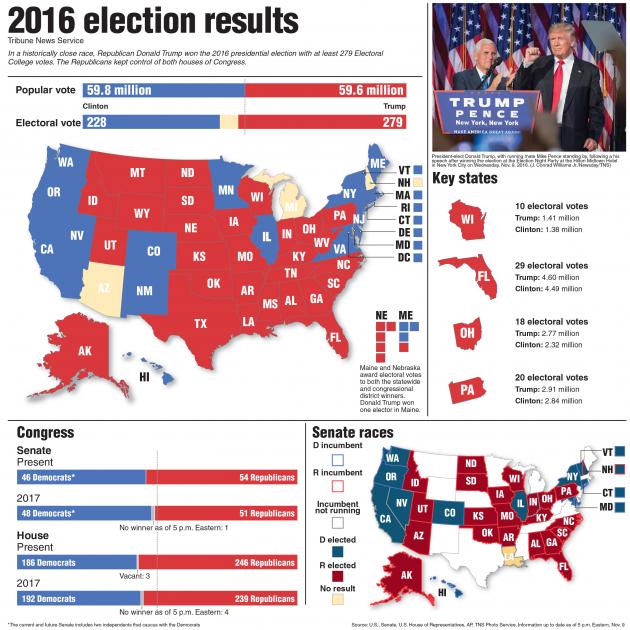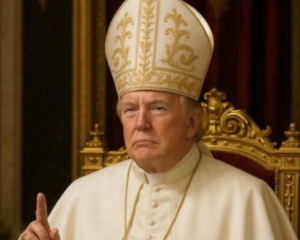
President-elect Donald Trump will have an early Capitol Hill honeymoon with Republican majorities in both chambers of Congress when he takes office in January - but a long-term romance may be more challenging.
A president whose party controls both the Senate and House of Representatives can generally count on getting things done fairly quickly and Trump likely will not be an exception, despite starting with unusual handicaps.
Many Republicans in Congress only backed Trump after he became the candidate. Some never fell in line. He offended and attacked others while running as a Washington outsider, including House of Representatives Speaker Paul Ryan, who did not campaign with him.
On top of that, the New York real estate businessman and former reality television celebrity who will head the world's most powerful government and largest economy, has no governing experience.

On Wednesday, party leaders were quick to back the victor, and they are expected to find more common ground than differences once he takes office.
"Donald Trump will lead a unified Republican government," Ryan told a news conference in his home state, Wisconsin, promising to "work hand in hand."
Ryan said his relationship with Trump "is fine," the transition is under way, and he has already spoken to the president-elect twice, and to his running mate, Indiana Governor Mike Pence, a former House member.
"Most of the things he's likely to advocate, we're going to be enthusiastically for," Senate Majority Leader Mitch McConnell told a news conference on Capitol Hill.
OBAMACARE IN CROSSHAIRS
Trump and Republican leaders in Congress agree on one major policy: They want to repeal Democratic President Barack Obama's landmark Obamacare healthcare law, enacted in 2010. Ryan and McConnell both pledged to deal quickly with the law.
They will also move quickly to confirm a Trump nominee for the Supreme Court, after McConnell refused to consider any Obama nominee after conservative Justice Antonin Scalia died in February, infuriating the White House and Senate Democrats.
Other issues might be more contentious within the party.
While campaigning, Trump spoke extensively about scrapping trade deals and building a wall along the US- Mexico border, but some Republicans are skeptical about both those pledges.
The party has long been in favor of free trade, and Trump's wall scheme would bear a $US25 billion price tag and anger Mexico, an important ally and trading partner.
McConnell said on Wednesday he wanted to achieve border security in whatever way was most effective. And he said the new president was free to negotiate trade pacts.
Trump will also have to work with Democrats, who made narrow gains on Tuesday that reduced the size of the Republican majorities in the House and Senate.
With some votes still being counted, they won a handful of new seats in the House.
In the Senate, they seemed to secure at least 48 seats, up from 46, on Wednesday when the New Hampshire Secretary of State called a close race for New Hampshire Governor Maggie Hassan, a Democrat, over incumbent Republican Senator Kelly Ayotte, although Ayotte had not conceded.
Controlling only 52 seats, Republicans will need Democrats to reach the 60 votes needed to advance most legislation in the 100-member Senate.
"Trump will have to work with a fair number of Senate Democrats to get things done," said William Galston, an expert in governance studies at the Brookings Institution.
One of those things could be infrastructure spending, which Trump promised in his victory speech. Spending on infrastructure to fuel job growth, is popular with lawmakers from both parties, possibly funded by ending a law that lets corporations hold profits offshore without paying US taxes on them.

PARTY UNITY
Trump's Republican critics in Congress said they hoped Trump would work toward party unity, but they would be watching him.
"Starting today, I will do everything in my power to hold the President to his promises," including fighting to enact term limits and repealing Obamacare, Senator Ben Sasse, who opposed Trump from the start, said in a statement.
Repealing Obamacare would shake the US healthcare and insurance industries, which have broadly called for measured reforms, although not for its full-scale elimination.
America's Health Insurance Plans, or AHIP, a trade association that represents insurers such as Anthem Inc and Cigna Corp in Washington, said late on Tuesday that it would work with any new administration on the issue.
Trump has called Obamacare a "disaster" and vowed to repeal and replace it. House Republicans have already voted more than 50 times to repeal all or part of the law.
Senate Democrats were certain to fight an Obamacare rollback, but could be outmaneuvered by Republicans at the procedural level with Trump's cooperation.
"It would be a tragedy, and I certainly won't in any way cooperate or work with an effort to take health insurance away," Senator Angus King, a Maine independent who caucuses with Democrats, told CNN.
Trump and congressional Republicans will find common ground on taxes. Trump generally sees eye to eye with Republicans in Congress in calling for major tax cuts, including those for the wealthy, although details of their plans are not an exact match.
Trump has called for cutting the US corporate income tax rate to 15% from the current level of 35%; Ryan's tax plan proposes going to 20%.
Trump has also said he wants to do some things as president, such as ban Muslims from the country and allow torture in the fight against terrorism, that some legal experts say are legally questionable.

SUPREME COURT PICK
Trump's presidential election victory gives him the chance to appoint a pivotal fifth conservative justice on the US Supreme Court.
The appointment, possibly the first of multiple picks, would allow Trujmp to restore the decades-long conservative majority on the bench, which looked under threat when conservative Justice Antonin Scalia died in February this year. The shorthanded court currently is split with four conservatives and four liberals.
Conservative activists may be emboldened to bring cases urging the court to support gun rights, uphold abortion restrictions and rule for religious rights.
One issue the court could take up in the near term is whether business owners who oppose same-sex marriage can object on religious grounds to providing services to gay couples. One dispute concerns a baker in Colorado, while another involves a florist in Washington state.
In the labour context, the high court could also revisit whether states can force nonunion workers to pay unions for collective bargaining activities. The court split 4-4 on the issue in March, just after Scalia's death, in a loss for conservative groups challenging the practice.
Trump is poised to nominate a new justice as soon as he takes office in January. He may also be able to make further appointments to the court, with three justices 78 or older, including 83-year-old liberal Ruth Bader Ginsburg, whom Trump called on to resign in July after she called him a "faker" and speculated about the possibility of moving to New Zealand if he won the White House.
Fellow liberal Stephen Breyer is 78, while conservative Anthony Kennedy is 80.













